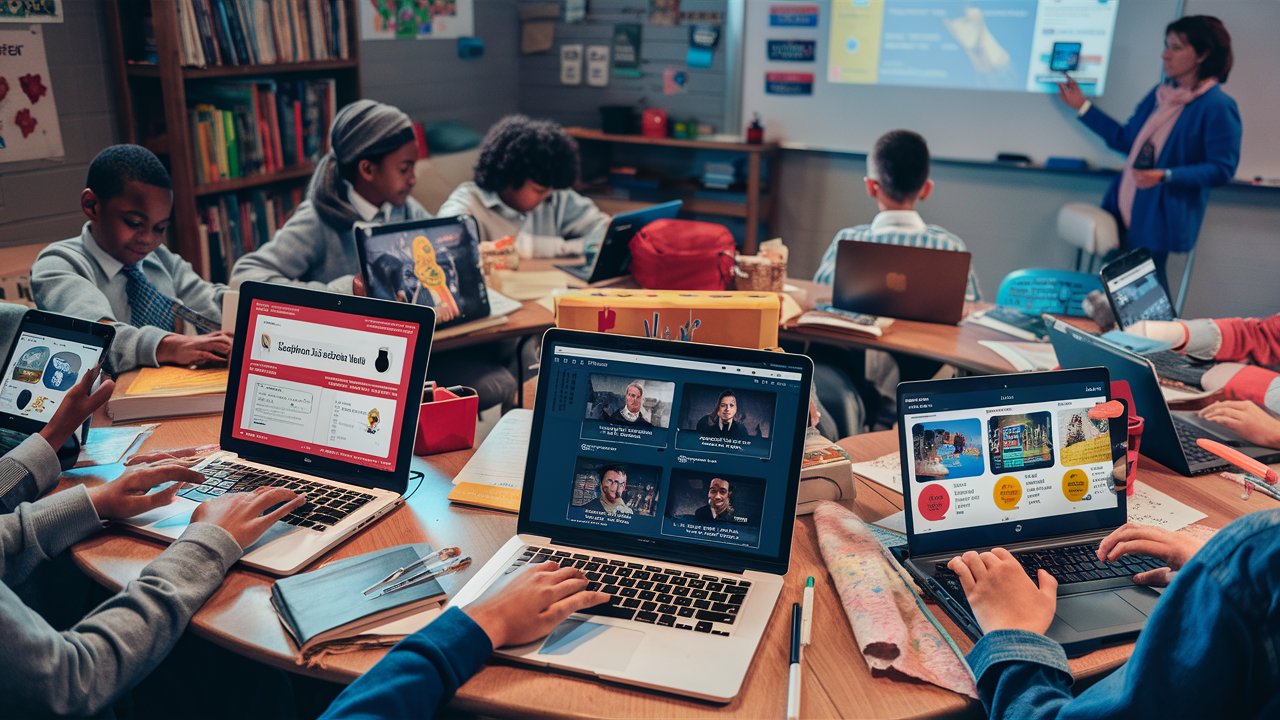The digital age has brought about a transformation in various sectors, with education being one of the most profoundly impacted. Digital learning platforms have revolutionized the way we access, consume, and engage with educational content. These platforms have democratized education, breaking down geographical barriers and making learning more accessible and flexible than ever before. This article delves into the rise of digital learning platforms, their benefits, challenges, and the future of education in a world.
Table of Contents
ToggleThe Rise of Digital Learning Platforms
The advent of the internet and the proliferation of smart devices have paved the way for digital learning platforms. These platforms range from Massive Open Online Courses (MOOCs) like Coursera and edX to specialized platforms like Khan Academy and Duolingo. The COVID-19 pandemic further accelerated the adoption of these platforms as schools and universities worldwide shifted to online learning.
One personal experience that underscores the importance of digital learning platforms is my own journey during the pandemic. As a student, I found myself suddenly transitioning to online classes. Initially, the change was daunting. However, platforms like Coursera and Khan Academy provided me with the resources and flexibility to continue my education seamlessly. I could access lectures, assignments, and even virtual labs from the comfort of my home, illustrating the incredible adaptability of digital learning

Benefits of Digital Learning Platforms
1. Accessibility and Flexibility
One of the most significant advantages of digital learning platforms is their accessibility. Students from remote areas or those with mobility issues can access quality education without the need to travel. These platforms offer flexibility, allowing learners to study at their own pace and schedule. This flexibility is particularly beneficial for working professionals looking to upskill or change careers.
2. Diverse Learning Resources
Digital learning platforms provide a plethora of resources, including video lectures, interactive quizzes, discussion forums, and downloadable materials. This variety caters to different learning styles, making education more engaging and effective. For instance, visual learners benefit from video content, while those who prefer reading can access detailed notes and articles.
3. Cost-Effectiveness
Traditional education can be expensive, with costs including tuition, textbooks, and accommodation. Digital learning platforms often offer courses at a fraction of the cost, with many resources available for free. For example, platforms like Khan Academy provide comprehensive lessons in various subjects without any charges, making education more affordable and inclusive.
4. Personalized Learning
Advanced digital learning platforms leverage artificial intelligence and data analytics to offer personalized learning experiences. They can track a learner’s progress, identify strengths and weaknesses, and provide tailored recommendations. This personalized approach ensures that learners receive the support they need to succeed.
5. Global Collaboration and Networking
Digital learning platforms facilitate global collaboration, allowing students to interact with peers and instructors from around the world. This exposure to diverse perspectives enriches the learning experience and prepares students for a globalized workforce. Personally, I have participated in discussion forums and group projects with students from different countries, gaining valuable insights and forming lasting connections.
Challenges of Digital Learning Platforms
1. Digital Divide
Despite the many benefits, digital learning platforms are not without challenges. One of the primary issues is the divide. Not all students have access to reliable internet connections or digital devices, limiting their ability to participate in online learning. Addressing this disparity is crucial to ensure that digital learning platforms are truly inclusive.
2. Lack of Social Interaction
Traditional classrooms offer opportunities for social interaction, which is essential for developing communication skills and building relationships. Digital learning platforms can sometimes lack this element, leading to feelings of isolation. However, many platforms are now incorporating social features like live chat, virtual study groups, and collaborative projects to mitigate this issue.
3. Self-Discipline and Motivation
Online learning requires a high degree of self-discipline and motivation. Without the structure of a physical classroom, some students may struggle to stay on track. It is essential for learners to develop time-management skills and self-motivation to succeed in a digital learning environment.
4. Quality and Credibility
With the proliferation of learning platforms, ensuring the quality and credibility of courses is a concern. Not all platforms adhere to the same standards, and some may offer subpar content. Learners need to research and choose reputable platforms that provide high-quality education and are recognized by employers and educational institutions.
The Future of Digital Learning Platforms
The future of education is undoubtedly digital. As technology continues to evolve, digital learning platforms will become even more sophisticated and integrated into mainstream education. Here are some trends that are likely to shape the future of digital learning:
1. Virtual Reality (VR) and Augmented Reality (AR)
VR and AR have the potential to transform education by providing immersive learning experiences. Imagine studying history by virtually visiting ancient civilizations or learning anatomy through interactive 3D models. These technologies can make learning more engaging and impactful.
2. Artificial Intelligence (AI)
AI will play a significant role in personalizing education further. Intelligent tutoring systems can provide real-time feedback, adapt to individual learning styles, and predict learning outcomes. AI can also assist in administrative tasks, allowing educators to focus more on teaching.
3. Lifelong Learning
The concept of lifelong learning is gaining traction, with individuals continuously updating their skills to stay relevant in a rapidly changing job market. Digital learning platforms are ideal for lifelong learners, offering courses that cater to various stages of career development.
4. Hybrid Learning Models
The future of education is likely to involve a blend of traditional and digital learning. Hybrid models can provide the best of both worlds, combining the social interaction of physical classrooms with the flexibility and resources of digital platforms. This approach can cater to diverse learning needs and preferences.

Conclusion
Digital learning platforms have revolutionized education, making it more accessible, flexible, and personalized. While challenges such as the divide and the need for self-discipline exist, the benefits far outweigh the drawbacks. My personal experiences with digital learning during the pandemic have highlighted the incredible potential of these platforms to provide quality education in unprecedented times.
As technology continues to advance, learning platforms will play an increasingly vital role in shaping the future of education. By embracing these platforms and addressing their challenges, we can create a more inclusive and effective educational landscape for learners worldwide. The revolution in education is here, and it is digital.
4o








